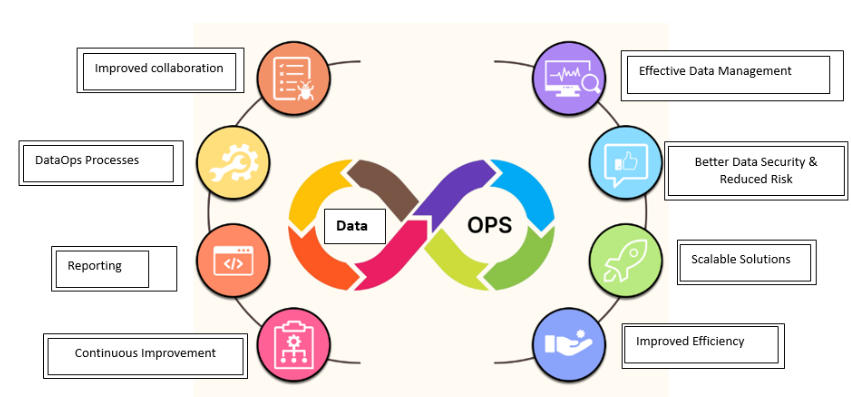
Listen to this blog
Data is one of the most valuable assets of any organization. It provides insights into customer behavior, workflows and aids in effective decision making. Today, data is generated at an unprecedented rate in many different forms. Businesses must ensure that they can acquire, process, and analyze this data effectively and efficiently to derive insights and make informed decisions. DataOps is a methodology that addresses the challenges associated with managing data in modern organizations. It helps companies optimize their data operations, improve data quality, enhance efficiency, and reduce costs - thereby enabling organizations to focus on their core business goals.
In this blog, we will discuss the importance of DataOps in today's data-driven world.
What is DataOps?
DataOps involves managing the entire data analytics process from data collection, storage, analysis, to data visualization - but it is more than that. DataOps can also be referred to as a culture; a mindset that enables multiple teams to work better together. It emphasizes good communication, increased transparency, and enhanced coordination between different stakeholders that work with data.
The DataOps culture leads to improved data management, while saving time, cost and effort, and helps organizations manage their end-to-end data pipelines more efficiently. When implemented correctly, DataOps can help improve data platform stability, provide greater scalability, improve operational efficiency, and increase agility in responding to changing business needs while successfully meeting business objectives.
Here are some of the reasons why DataOps is essential in today's data-driven world:

![]()
Effective Data Management
DataOps enables businesses to manage their data more efficiently by proactively monitoring technology infrastructure, applications and workflows to ensure that they are performing optimally, which is critical for making informed decisions. These services provide businesses with the tools and expertise they need to collect, store, and manage data in a way that is both effective and efficient. Effective data management ensures that business users have access to accurate data in a timely manner, which they can use to make data-backed decisions that drive growth and success.
Better Data Security & Reduced Risk of Data Breaches
DataOps can help businesses improve their data security by providing secure data storage and management solutions. These services use advanced security measures to protect sensitive data, ensuring that it remains safe and reliable at all times. This also protects data from any hacks or leaks and enables businesses to gain their customers’ trust as data breaches are a major risk for organizations and the consequences can be severe. DataOps enables organizations to reduce the risk of data breaches by providing an efficient and automated approach to managing data.
Data regulations such as GDPR and CCPA require organizations to manage data more effectively, thus ensuring that data is accurate, complete, and up-to-date while reducing the risk of data breaches. DataOps provides an efficient and automated approach to managing data, ensuring that organizations can comply with data regulations easily and effectively. Scalable Solutions
DataOps offers businesses scalable solutions that can grow and evolve as their data needs change. This means that businesses can start with a small solution and then scale up as their data needs increase over time. This flexibility enables businesses to adapt to changing market conditions and customer demands, ensuring that they remain competitive.
Improved Efficiency
DataOps can help businesses improve their efficiency by identifying opportunities to eradicate manual interventions and automating many of the tasks associated with data management. This enables employees to focus on other tasks that are critical to the success of the business. Additionally, these services can provide businesses with real-time insights which can help them make quick decisions to improve their bottom line.
Reporting
DataOps provides regular reports to the organization's leadership team, detailing the performance of the technology infrastructure and applications, along with details on the issues that were addressed. These reports may include key performance indicators (KPIs), incident reports, and service level agreement (SLA) reports, aiding organizations in informed decision making. Reporting also helps with governance and compliance and ensures that organizations meet regulatory requirements.
Continuous Improvement
An effective DataOps service allows teams to receive continuous feedback across every stage of the data lifecycle. This becomes an ongoing activity which involves identifying areas for improvement and implementing changes to address these areas. It also includes continuously monitoring and refining the DataOps plan, excelling in data pipeline observability, and performing in-depth root-cause analysis as well as taking corrective and preventive measures to ensure that data meets the organization's needs.
DataOps Processes
- DataOps provides a set of standard operating procedures to accomplish tasks in an organized way, such as:
- Incident Management: Reduce outages, improve productivity, meet SLAs, and manage the complete life cycle of IT tickets
- Change Management: Streamline planning, approval, and implementation with automated workflows
- Problem Management: Analyze root causes and reduce repeat incidents
- Capacity Management: Ensure a business always maximizes its potential activities and production output under all conditions
Improved Collaboration and Communication Across Teams
DataOps emphasizes collaboration and communication between teams, ensuring that data is managed effectively across the entire organization. By improving collaboration and communication, DataOps helps in breaking down team silos which enables organizations to share data more effectively, ensuring that everyone has access to the same data and enabling teams to work together more effectively and with greater transparency in achieving common business goals. With increased communication, each team understands their own goals and aligns them to achieve overall business objectives. Not only this but with greater collaboration and communication, teams can easily identify errors and address them proactively to avoid any serious consequences.
Conclusion
DataOps is an integrated approach, a holistic view, which brings together people, processes, tools and technologies. It involves a set of activities that are designed to help businesses manage their technology infrastructure, applications, and workflows to support their day-to-day operations. It also helps protect their data and ensures availability of high-quality data, along with offering scalable and cost-effective solutions that can adapt to changing business needs. With the help of DataOps, businesses can make informed decisions that drive growth and success, and enable them to be proactive in a competitive, data-driven world.




